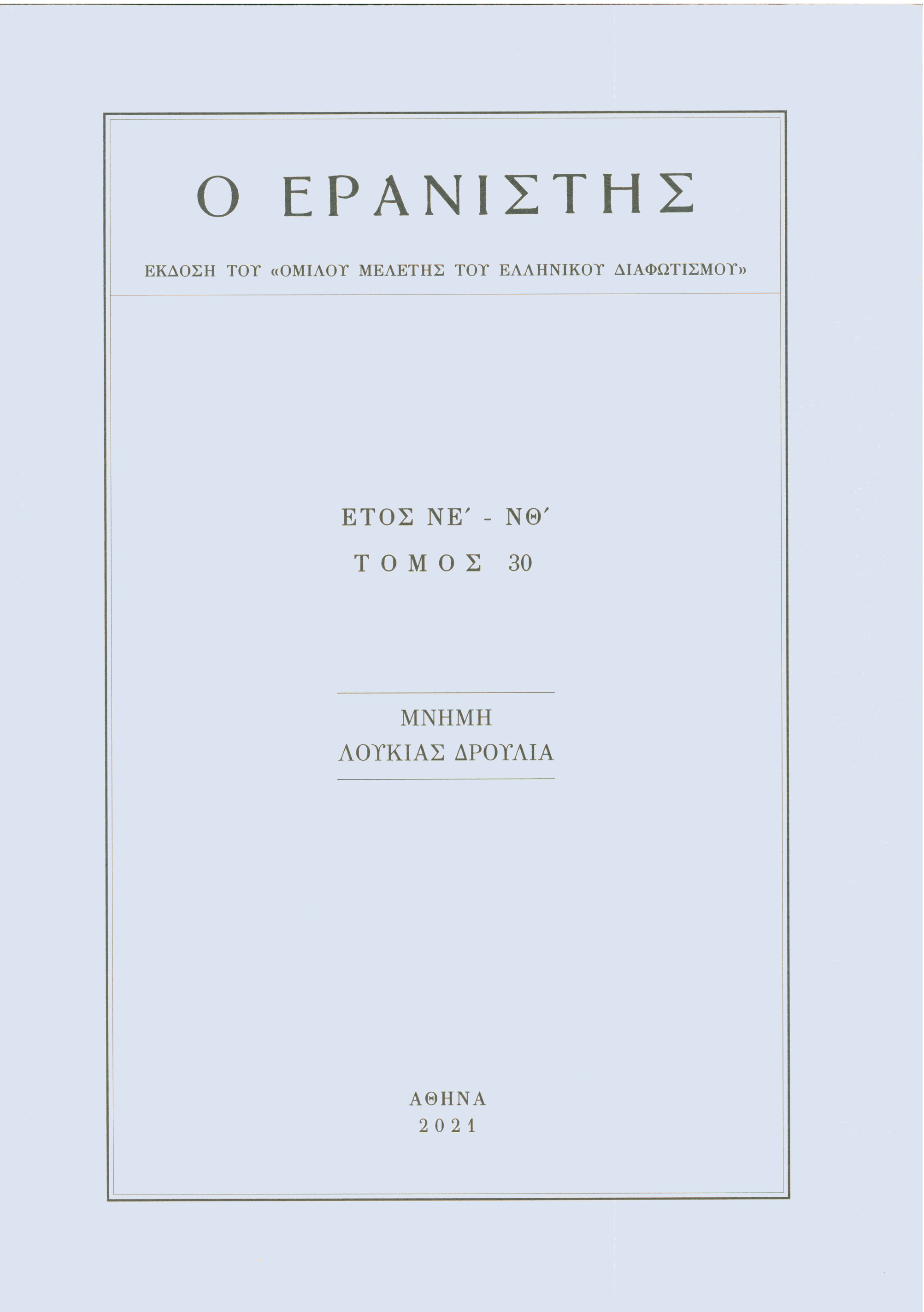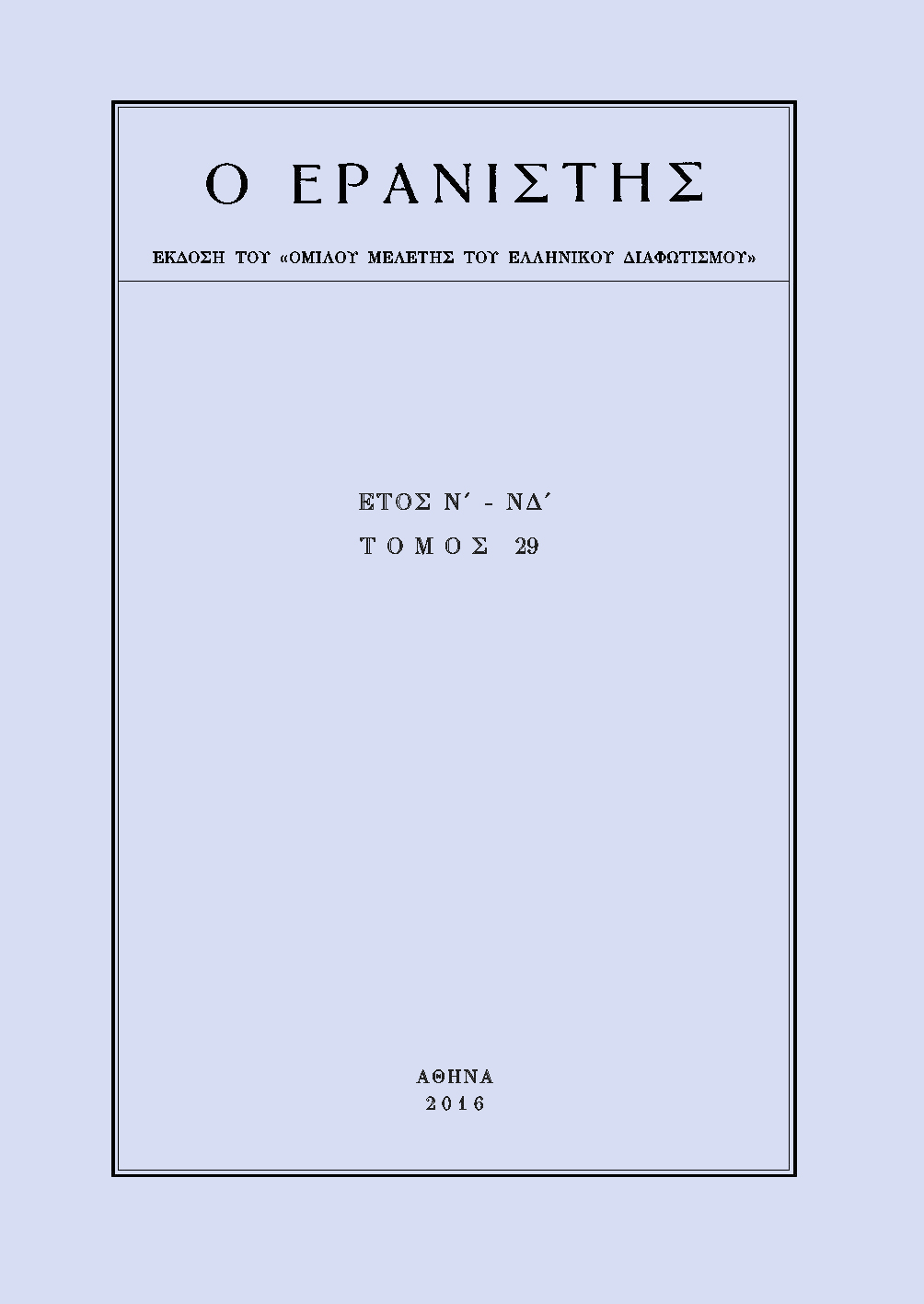Αρμόδιος και Αριστογείτων Μια διασκευασμένη τυρρανοκτονία στο ελληνικό προεπαναστατικό θέατρο

Περίληψη
Harmodius and Aristogeiton. An Adapted Tyrannicide in the Greek Pre-revolutionary Theater
The tragedy Αρμόδιος και Αριστογείτων (Harmodius and Aristogeiton) is the most radical theatrical play performed by Greek amateur actors in Odessa in the years 1814-1820, since its subject is the tyrannicide as a legitimate resistance of citizens to power, when it arbitrarily abolishes natural law. The tragedy, first staged in 1819, was until now considered to be an original work of Georgios Lassanis (1793-1870), but my article proves that in fact it is a theatrical adaptation of a part of the novel Aristides und Themistocles (1792), written by the German scholar Ignaz Aurelius Feßler (1765-1839), a member of the Illuminati Order. A comparison of the novel with the ancient sources for the two tyrannicides shows that the changes made by the enthusiastic Kantian Feßler (mainly the concealment of the homoerotic character of the relationship between the two heroes) aimed to adapt the historical material to Kant’s conception that morality is based on the autonomy of the will. Lassanis kept the changes of Feßler and added some new inventions which emphasize even more the autonomy of the will as a condition of morality. The close relationship of Lassanis’ dramaturgy with his engagement as a member of the Filiki Etaireia becomes obvious not only in the choice of the subject of death for the homeland and democracy but is also manifest in his (pen-)name «Lyssanias». Lassanis’ nom de guerre is not a phonic variant of his name (as it has commonly been assumed until now) but rather refers to the verse of Aristophanes «Λυσανίαι πατρῴων μεγάλων κακῶν»; it therefore denotes one who liberates the homeland from sorrow and pain.
Λεπτομέρειες άρθρου
- Πώς να δημιουργήσετε Αναφορές
-
Χατζηπαναγιώτη-Sangmeister Ί. (2024). Αρμόδιος και Αριστογείτων: Μια διασκευασμένη τυρρανοκτονία στο ελληνικό προεπαναστατικό θέατρο. Ο Ερανιστής, (30), 253–286. https://doi.org/10.12681/er.36101
- Ενότητα
- Μελετήματα

Αυτή η εργασία είναι αδειοδοτημένη υπό το CC Αναφορά Δημιουργού – Μη Εμπορική Χρήση – Παρόμοια Διανομή 4.0.
Πνευματικά δικαιώματαΟι συγγραφείς των άρθρων που δημοσιεύονται στον ΕΡΑΝΙΣΤΗ διατηρούν τα δικαιώματα πνευματικής ιδιοκτησίας επί των άρθρων τους, δίνοντας στο περιοδικό το δικαίωμα της πρώτης δημοσίευσης. Άρθρα που δημοσιεύονται στον ΕΡΑΝΙΣΤΗ μπορούν να χρησιμοποιούνται ελεύθερα για μη κερδοσκοπικούς σκοπούς, χωρίς δικαίωμα τροποποίησης (δημιουργία νέου παράγωγου έργου) και με αναφορά πάντοτε στον συγγραφέα και στην πρώτη δημοσίευση (άδεια Creative Commons 3.0). Ο Όμιλος Μελέτης του Ελληνικού Διαφωτισμού (ΟΜΕΔ) διατηρεί το δικαίωμα να δημοσιεύει, να αναπαραγάγει, να παρουσιάζει στο κοινό, να διανέμει και να χρησιμοποιεί άρθρα που δημοσιεύονται στον ΕΡΑΝΙΣΤΗ σε οποιοδήποτε μέσο και μορφή, είτε μεμονωμένα είτε ως μέρος συλλογικών έργων, για ολόκληρο το χρόνο διάρκειας προστασίας της πνευματικής ιδιοκτησίας και για όλες τις χώρες του κόσμου. Αυτό περιλαμβάνει, ενδεικτικά και όχι αποκλειστικά, το δικαίωμα δημοσίευσης των άρθρων σε τεύχη του περιοδικού Ο ΕΡΑΝΙΣΤΗΣ, αναπαραγωγής και διανομής μεμονωμένων αντιγράφων των άρθρων, αναπαραγωγής ολόκληρων των άρθρων σε άλλη έκδοση του ΟΜΕΔ, και αναπαραγωγής και διανομής των άρθρων ή περίληψης αυτών με χρήση πληροφορικού συστήματος αποθετηρίου.



